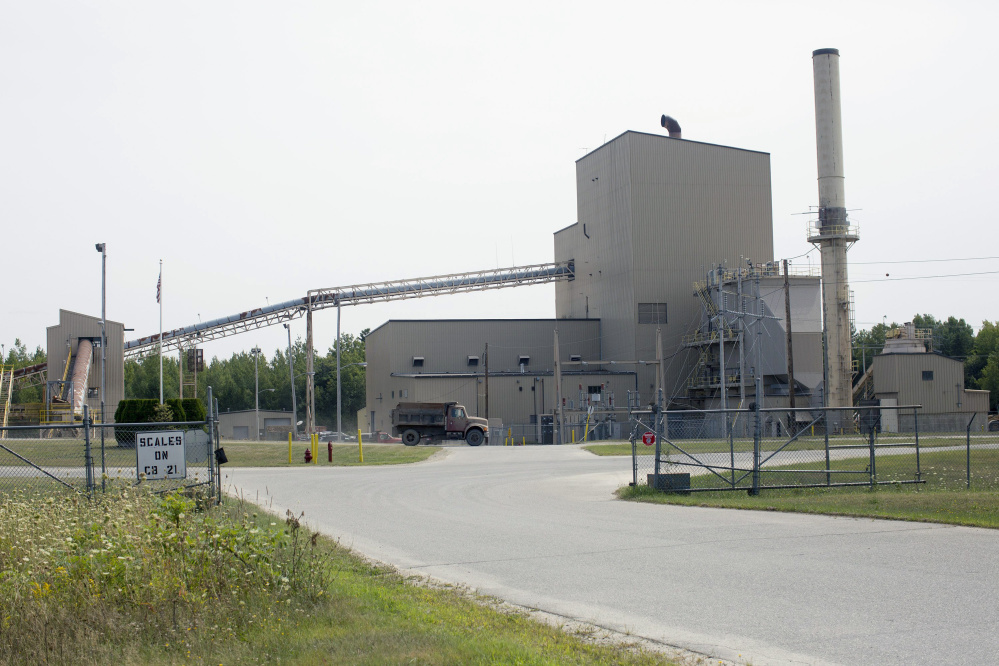The owner of a wood-fired power plant in West Enfield that wants state financial help to build three shrimp farms on the property got a boost Tuesday when the Maine Rural Development Authority approved a $500,000 loan for the venture.
Board members voted 6-0 to approve the loan to Kathadin Shrimp Farm LLC, which is solely owned by Stored Solar West Enfield LLC.
The approval came with conditions, which include receipt of management agreements with the shrimp farm operator, as well cash equity and capital investments by Stored Solar. The specific amounts are confidential, according to Doug Ray, an agency spokesman, but the equity requirement far exceeds the $500,000 loan amount, he said.
The future of wood-fired power plants has been of great interest in rural Maine. They currently provide hundreds of jobs for loggers and truckers and are an outlet for bark and sawdust from lumber mills. But they also hold promise as sites to host new bioeconomy ventures, ranging from greenhouses and fish farms to emerging technologies, such as making jet fuel and heating oil additives from trees.
“Hopefully, this can be a model for other co-hosts,” Ray said.
The loan request had come under fire earlier this fall because Stored Solar had been accused of owing hundreds of thousands of dollars to loggers and being delinquent on tax payment in Jonesboro, where it owns a second biomass plant. But in an interview last month with the Press Herald, Stored Solar’s owners said they had invested $17 million of their own money to restart the plants, pay debts and advance their visions of a bioeconomy.
Low wholesale electric prices in New England make it hard for Maine’s aging stand-alone biomass power plants to be profitable today. They need to gain additional revenue from selling excess electricity, steam and carbon dioxide to other on-site businesses. In West Enfield, Stored Solar has a five-year plan to co-host a mix of biorefineries, agriculture and aquaculture operations that can use those resources, which now are wasted.
The loan approval comes as Stored Solar says it’s making progress in its effort to restart and profitably operate two closed biomass power plants it purchased last year, according to a recent performance update filed at the Public Utilities Commission.
The update was required last year by the Legislature, in exchange for a power-rate subsidy that’s tied to in-state economic benefits – biomass purchases, job creation and capital spending.
In the latest quarterly report, the company says it had bought and stockpiled 350,000 tons of wood fuel by the end of September. It said 50 full-time equivalent workers were on the payroll to complete upgrades at the two plants, and those job levels were expected to remain into next year.
It also tallied roughly $1.8 million in capital improvements through September, with a year-end goal of $2.5 million.
Taken together, Stored Solar calculated that it had reached 85 percent of its performance goal for jobs, 70 percent for biomass purchases and 47 percent for capital spending in the first nine months of the year.
The company noted that it was forced to spend its own money to make improvements. Stored Solar had sought a $5 million loan from an investment firm, tied to a guarantee from the Finance Authority of Maine. The Press Herald reported last month that the investment firm, Arctaris Royalty Ventures Co-Investment LP, had withdrawn the loan guarantee request. Stored Solar says the investor has reserved the right to revisit the request in the future.
In its report the PUC, Stored Solar says final boiler inspection is under way at the Jonesboro plant, with plans to run at full capacity early this month.
“Winter wholesale electricity prices will determine the percentage of continuous operation,” the company said.
Stored Solar also said it has paid delinquent property taxes to the town and is discussing the assessment for personal property taxes.
West Enfield is in full operation, the company said. It has reached agreement with Eco-Shrimp Garden of Newburgh, New York, to build a shrimp farm next to the plant in 2018. Production is planned for 55,000 pounds of shrimp per year.
The five-year loan has a 4 percent interest rate and would be secured by real estate and other business assets, as well as a guarantee of a related company, Capergy US LLC. Capergy’s chief executive, Fahim Samaha, is a partner in Stored Solar and is listed on the Maine Rural Development Authority loan as a principal in Katahdin Shrimp Farm, according to the finance authority. He also is the husband of Kimberly Samaha, the CEO at Synthesis Venture Fund Partners.
The rural development authority was created by the Legislature to provide financial help to communities and their development partners, with a focus on rural, economically distressed parts of the state. It helps develop speculative and underused commercial and industrial properties and is overseen by a board that includes the finance authority and the state Department of Economic and Community Development.
Tux Turkel can be contacted at 791-6462 or
tturkel@pressherald.com
Twitter@TuxTurkel
Send questions/comments to the editors.



